Live on the homepage now!
Reader Supported News
Finally speaking briefly on Tuesday afternoon, Bolsonaro offered implicit criticism of some methods employed by demonstrators but did not concede defeat, congratulate Lula, or ask his supporters to stand down. “The current popular movements are the product of indignation and feelings of injustice with the electoral process,” he said. “Peaceful protests are always welcome, but we cannot adopt the methods of the left, who have always harmed the population by invading and destroying property and restricting free movement.”
Bolsonaro has been under pressure from allies and many foreign governments, and most paths to an effective coup d’état now seem closed. The military has stayed silent, courts have ordered the highways cleared, and prominent government figures have recognized Lula’s victory. But hardcore Bolsonaristas and some elements within the Brazilian police have appeared committed to complicating the transition.
“He may have waited to speak for so long because he was afraid of appearing powerless, and now that he did, the limits on him do seem clear,” said Mathias Alencastro, a political scientist at the Centro Brasileiro de Análise e Planejamento. “He cannot tell his base to demobilize because it would be the end of his political project. But he cannot tell them to escalate because there is nowhere to escalate to.”
At Brazil’s largest bus terminal early Tuesday morning, stranded commuters slept on the floor as listless ticket agents refreshed maps of highway paralysis across the country. Truck drivers and protesters had blocked roads in almost every state, sometimes by setting tires on fire and placing them in the way of traffic, and the country’s largest airport was surrounded. Outside the São Paulo bus station, taxi drivers scrolled their phones, checking in on a steady stream of baseless rumors about voting irregularities and insider plotting.
“Facebook and WhatsApp are going crazy!” one cabbie told me. “It looks like the military is going to intervene today and arrest the head of the Electoral Court.”
But in the real world, major figures around Bolsonaro have accepted that he lost, including Ricardo Salles, the notorious former environmental minister; former judge Sergio Moro, the man who imprisoned Lula in 2018 (before the Supreme Court overturned the charges); and Carla Zambelli, the politician who pulled a gun on an unarmed Black man on Saturday and chased him through the streets of São Paulo after an argument about the election. All three were elected to Congress in first-round voting last month, underlining another reason for the president’s relative isolation: The Bolsonarista bloc did so well that it makes more sense for many extreme-right politicians to take office and mount opposition than it does to make a dangerous bet on a radical insurrection.
Since Sunday, the major node of institutional crisis in Brazil has been the relationship between the country’s electoral authority, the Tribunal Superior Eleitoral, and the country’s highway police, the Polícia Rodoviária Federal. Before the election, the head of the PRF had asked his Instagram followers to vote for Bolsonaro, then deleted the post; he then disobeyed Electoral Court orders by pulling over buses across the country and stopping voters on their way to the polls. Powerful Supreme Court justice and TSE chief Alexandre de Moraes, the center of a lot of attention this year, dragged PRF chief Silvinei Vasques in for questioning and ordered him to stand down. Then, as Bolsonarista protests sought to “paralyze” the country Monday and Tuesday and some PRF officers expressed support for the wave of golpista roadblocks, the same judge ordered the same police chief to clear the roads once more or face arrest.
Things have been much clearer on the international front. Within minutes of the results on Sunday night, foreign leaders began to congratulate Lula on his victory. This was apparently a coordinated effort on the part of many embassies in Brazil that sought to underline their support for democracy in the country and make it harder for Bolsonaro to contest an election. For at least a year, he has attacked the electoral system itself, laying the groundwork for a Trump-style rejection of the results or something much worse. On Sunday night, Lula retweeted messages of support from President Joe Biden, Spanish prime minister Pedro Sánchez, French president Emmanuel Macron, and many others, as Bolsonaro simply turned off the lights in the presidential palace at 10 p.m. and went to bed.
Given the deep fears that many pro-democracy Brazilians have held over the past few months — that the voting process could be derailed, Bolsonaro could be reelected, or he could openly call for a violent uprising after losing — some citizens and analysts were relieved that the worst thing to happen so far has been wildcat road blockages that lack much institutional support. But for many people, this is a low bar.
“He is the president! Bolsonaro is not just supposed to refrain from wrecking the county more; he is supposed to actually govern. It was his job to recognize the result and make sure the roads actually work,” said Maria, who works on elevators in downtown São Paulo but asked to keep her last name private so she could really let loose. “He is a criminal!”
READ MORE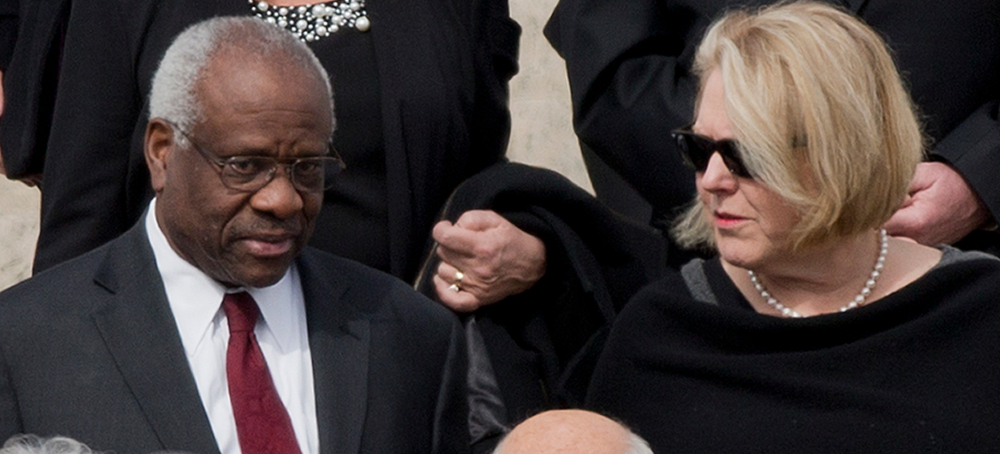 Supreme Court Associate Justice Clarence Thomas and his wife Virginia Thomas leave the the Basilica of the National Shrine of the Immaculate Conception in Washington after attending funeral services of the late Supreme Court Associate Justice Antonin Scalia, on Feb. 20, 2016. (photo: Martinez Monsivais/AP)
Supreme Court Associate Justice Clarence Thomas and his wife Virginia Thomas leave the the Basilica of the National Shrine of the Immaculate Conception in Washington after attending funeral services of the late Supreme Court Associate Justice Antonin Scalia, on Feb. 20, 2016. (photo: Martinez Monsivais/AP)
Eight emails, ordered released by U.S. District Judge David O. Carter of California, include correspondence between Trump lawyers Kenneth Chesebro, John Eastman and others discussing various legal strategies to convince Republican members of Congress to object to the official certification of electoral votes in a joint session of Congress on Jan. 6, 2021.
In an email from Chesebro to Eastman and several others sent on Dec. 31, 2020, Chesebro argued that Thomas would “end up being key” to asking the high court to overturn then-President-elect Joe Biden’s win in contested states, and that they should “frame things so that Thomas could be the one to issue some sort of stay or other circuit justice opinion saying Georgia is in legitimate doubt.”
Thomas is the justice who oversees emergency petitions from the circuit court that includes Georgia.
“Realistically, our only chance to get a favorable judicial opinion by Jan. 6, which might hold up the Georgia count in Congress, is from Thomas — do you agree, Prof. Eastman?”
In an email sent hours later, Chesebro reiterated that he viewed “the best shot at holding up the count of a state in Congress” would be to get a case “pending before the Supreme Court by Jan. 5, ideally with something positive written by a judge or justice, hopefully Thomas.”
Days earlier, Chesebro on Christmas Eve morning sent an email to Eastman, Justin Clark, Bruce Marks, and others and put the odds of the court taking up the question and issuing a decision at no more than 5 percent — and of it doing so in Trump’s favor by Jan. 6 at “only 1 percent.”
But Chesebro said the “relevant analysis … is political” and “feeding the impression that the courts lack the courage to fairly and timely consider these complaints, and justifying a political argument on Jan. 6.”
Politico first reported on the contents of the new emails.
Eastman has argued that the set of disputed emails were protected by attorney-client privilege — a bedrock principle of U.S. legal practice that says a lawyer must keep confidential what they are told by their clients, and work product related to their representation. Carter cited a “crime-fraud exception” — including instances in which communications were part of a crime — ruling that “the emails are sufficiently related to and in furtherance of a conspiracy to defraud the United States.”
Eastman clerked for Thomas and has remained in touch with his wife, Virginia “Ginni” Thomas, according to email correspondence obtained by the House committee investigating the Jan. 6, 2021, attack on the U.S. Capitol. At least one of the emails showed Ginni Thomas inviting Eastman to speak on Dec. 8, 2020, to a group of conservative activists to provide an update about election litigation.
Ginni Thomas lobbied state legislators in Arizona and Wisconsin via email, urging them to help overturn Biden’s victory, The Washington Post has previously reported. Neither Ginni nor Clarence Thomas appear to be included on any of the newly released email correspondence and there is no indication in the emails that any of the lawyers directly appealed to Clarence Thomas regarding election litigation.
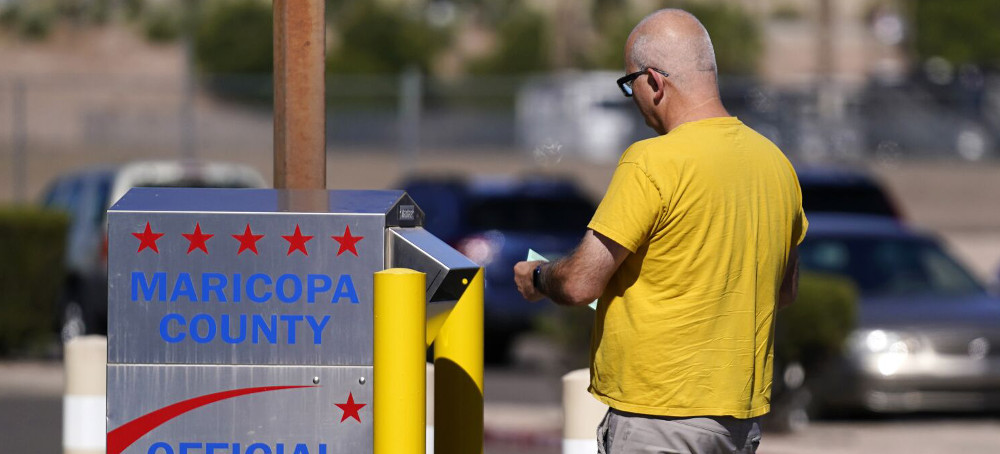 A voter places a ballot in an election drop box in Mesa, Ariz., on Friday. (photo: Ross D. Franklin/AP)
A voter places a ballot in an election drop box in Mesa, Ariz., on Friday. (photo: Ross D. Franklin/AP)
People wearing body armor and carrying weapons have been observed in recent days photographing and filming voters and their vehicles at ballot collection boxes in multiple states after former President Trump and his allies urged supporters to monitor them.
The temporary restraining order prohibits members of Clean Elections USA, which is led by Melody Jennings, a QAnon adherent who claims the 2020 election was stolen, from filming or photographing voters within 75 feet of a drop box; following people going to drop off ballots; physically being within 75 feet of the boxes or an entrance to a facility where the boxes are located; and from yelling at or speaking to voters dropping off ballots unless first engaged. Judge Michael Liburdi also ordered Jennings and Clean Elections USA to post on social media that Arizona law allows people to drop off ballots for relatives and spouses. Jennings has repeatedly claimed that voters cannot drop off more than one ballot.
The move comes after Liburdi, a Trump appointee, on Friday refused an injunction request from the Arizona Alliance for Retired Americans to block Clean Elections USA from monitoring voters dropping off their ballots, saying that the Constitution protected the activities of citizens gathering near ballot boxes.
Liburdi said Tuesday the temporary restraining order balances the 1st Amendment and voting privacy.
“The balance is [the drop box watchers] can get their information as long as the vehicle, the individual, is outside of that 75-foot limit, but when that person is actually reaching into the car to grab a ballot or ballots or putting the ballot or ballots into the drop box, they are entitled to some greater degree of privacy from being surveilled and video recorded and photographed, somewhat similar to what they would receive in the voting location,” he said.
The League of Women Voters of Arizona, which filed the lawsuit against two far-right groups including Clean Election USA, argue that organized third-party monitoring of ballot drop boxes, such as taking video or photos of people dropping off ballots and discussing the footage on social media, amounts to illegal voter intimidation.
“From the primaries till now ... the potential voter intimidation ... at the drop boxes have advanced and has made us pivot from what we would normally do to educate the voters and tell them how to protect their vote,” Pinny Sheoran, president of the League of Women Voters of Arizona, testified Tuesday.
Earlier this week, the court combined two separate Arizona lawsuits seeking to block the Arizona chapter of the Oath Keepers and Clean Elections USA from surveilling drop boxes in Arizona’s Maricopa and Yavapai counties. A third group, Lions of Liberty, was dropped from the League of Women Voters case after agreeing to stop monitoring drop boxes.
Arizona Alliance for Retired Americans has filed an emergency appeal in the U.S. 9th Circuit Court of Appeals.
The Justice Department argued in its filing that that it is possible to craft an injunction blocking threatening activity in a manner consistent with 1st Amendment protections of free speech and assembly.
“While the First Amendment protects expressive conduct and peaceable assembly generally, it affords no protection for threats of harm directed at voters,” the department’s lawyers wrote. “... The First Amendment does not protect individuals’ right to assemble to engage in voter intimidation or coercion. Nor does it transform an unlawful activity for one individual — voter intimidation — into a permissible activity simply because multiple individuals have assembled to engage in it.”
The use of secure ballot drop boxes increased during the COVID-19 pandemic. Attention from the far right has been fueled by the debunked film “2000 Mules,” which alleged that supposed “ballot mules” tracked by cellphone geolocation data stuffed drop boxes with fraudulent ballots during the 2020 election.
Liburdi also heard testimony Tuesday from multiple people who said they were photographed and filmed when they went to vote, including a witness whose name was not made publicly available because of concerns for his safety.
The voter from Mesa, Ariz., said he encountered a group of eight to 10 people while dropping off his and his wife’s ballots on Oct. 17. Several of the people who photographed and filmed them were armed, including one person who had a telephoto lens, the witness said, noting that his wife wanted to leave without voting. They were concerned the group would use the lens to photograph their signatures and phone numbers, which were on the ballot envelope as required by Arizona law. The witness said he hid the ballots under his shirt while he was out of vehicle. The group shouted at him that they were “hunting mules” and followed the couple’s car as they tried to leave the parking lot, he said.
“My wife was terrified,” he said before taking several moments to compose himself.
Jennings, the leader of Clean Elections USA, boasted online that photos and video of the man went viral on social media, claiming her group had caught a “mule.” The images also appeared in news stories nationwide. The witness said only a handful of family and friends know he is the person in the images and he fears being identified and harassed.
The Department of Justice weighed in on the case Monday, arguing in a brief that monitoring drop boxes could amount to illegal voter intimidation.
Such “vigilante ballot security measures,” probably violate the federal Voting Rights Act, the Justice Department said in a “statement of interest.” Monday’s filing was the first time the Justice Department has involved itself in a case during this midterm election cycle.
The Justice Department filing states that the Voting Rights Act of 1965 provides broad legal protections for voters against coercion and intimidation throughout each step of the voting process — including depositing ballots in drop boxes provided under local or state law.
“Although lawful poll-watching activities can support democratic transparency and accountability, when private citizens form ‘ballot security forces’ and attempt to take over the State’s legitimate role of overseeing and policing elections, the risk of voter intimidation — and violating federal law — is significant,” the department said in the filing.
READ MORE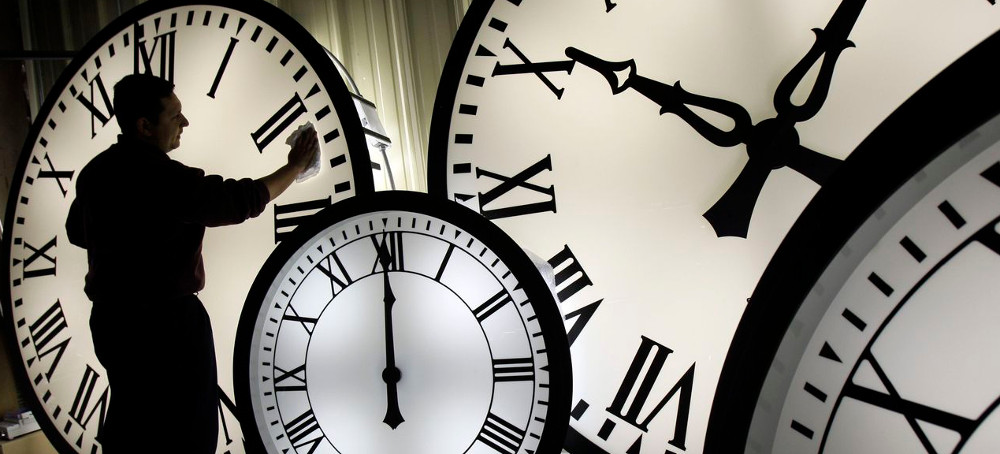 Peter Shugrue checks a clock at the Electric Time Company factory in Medfield, Massachusetts, on March 8, 2013. (photo: AP)
Peter Shugrue checks a clock at the Electric Time Company factory in Medfield, Massachusetts, on March 8, 2013. (photo: AP)
An animated story of what science says about changing our clocks in the fall and spring
Experts say early-morning sunlight is key to maintaining our circadian rhythms, sleep-wake cycles and overall health. Phyllis Zee, a neurologist and chief of sleep medicine at Northwestern University Feinberg School of Medicine, said without that sunlight, we can slip into circadian misalignment — “when your internal body clocks fall out of sync with that of the sun clock and your social clocks.”
The concern with adopting a permanent change to daylight saving time, which the Senate has voted to do, is that it may chronically throw our bodies out of sync with the sun and lead to a variety of health problems, sleep experts say.
“We would be misaligned all year long,” said Beth Malow, professor of neurology and pediatrics and the director of Vanderbilt University’s sleep division.
How is it that one hour can have such a significant impact? Scroll through this animation to learn more about how your brain and health are affected by time changes.
READ MORE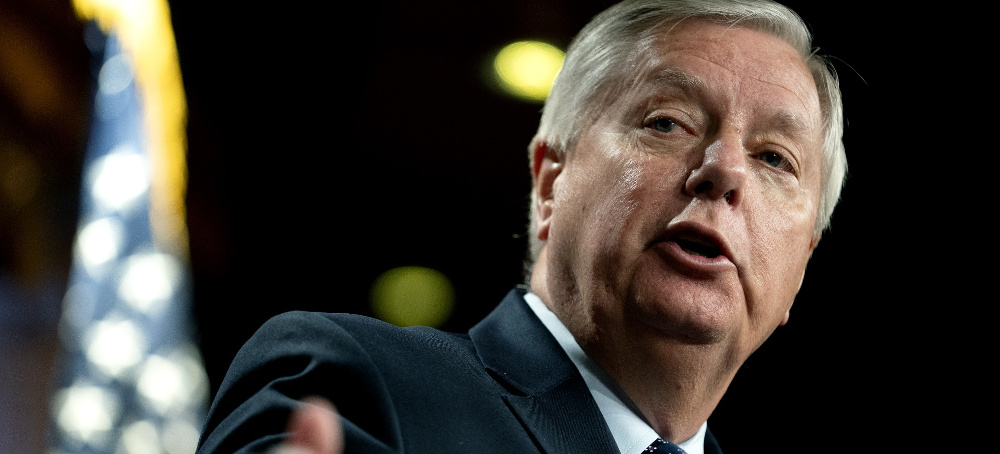 The Supreme Court said Sen. Lindsey Graham, R-S.C. must testify before a Georgia grand jury. (photo: Stefani Reynolds/Bloomberg)
The Supreme Court said Sen. Lindsey Graham, R-S.C. must testify before a Georgia grand jury. (photo: Stefani Reynolds/Bloomberg)
Graham filed an emergency request to block the subpoena late last month. Under the Constitution's "Speech or Debate" clause, sitting senators may not be "questioned" about their legislative activity, which protects them from civil and criminal liability in certain circumstances. The purpose of the clause is to shield legislators from unwarranted intrusions on their duties by other branches of government.
Graham argued that the actions he took following the election, which included phone calls to Georgia election officials, were legislative in nature – related to his role as then-chair of the Senate Judiciary Committee. Therefore, he said, he cannot be called to testify about these actions, even just as a witness. He further argued that the principle of "sovereign immunity" shields him from subpoena.
After granting a brief administrative stay to give Georgia prosecutors time to respond, the court decided to leave intact an Eleventh Circuit order allowing subpoena to remain in effect. The appeals court panel, which included two Trump appointees, said in a unanimous opinion that the lower court had sufficiently limited the range of questions Graham can be asked, in a way that prevents violating his immunity as a senator.
Fulton County, Ga., prosecutors cannot question Graham about "fact-finding inquiries" related to certifying the Georgia election results. Those portions of his phone calls, the district court judge ruled, were part of an "informal legislative investigation." Graham can also contest the legitimacy of questions as they arise.
The prosecutors can, however, question Graham about "non-legislative activity." This includes "communications and coordination with the Trump campaign regarding its post-election efforts in Georgia, public statements regarding the 2020 election, and efforts to 'cajole' or 'exhort' Georgia election officials."
Particularly at issue are phone calls Graham made to Georgia Secretary of State Brad Raffensperger in the weeks following the 2020 election. Raffensperger reported at the time that Graham had contacted him to suggest that mail-in ballots from certain counties should not be counted.
Court's opinion issued with the order assumes that the limits placed by the district court and the court of appeals are sufficient. The court particularly noted that Graham can return to the District Court to challenge "should disputes arise regarding the application of the Speech or Debate Clause immunity to specific questions." For this reason, the opinion said, a stay is not necessary.
There were no noted dissents.
If anything, the protection provided to Graham may go beyond what was necessary under Supreme Court precedent. Historically, the Speech or Debate Clause has been applied only to actions explicitly authorized by a committee or occurring during a legislative session, and not to other, "political" activities. In refusing to grant a stay, the Eleventh Circuit said that there's no clear requirement for merely "informal" legislative fact-finding to be protected at all, as the district court said it should be when it declared those parts of the calls off limits. The clause does not extend so far as to make members of Congress "super-citizens," the Supreme Court said in 1972.
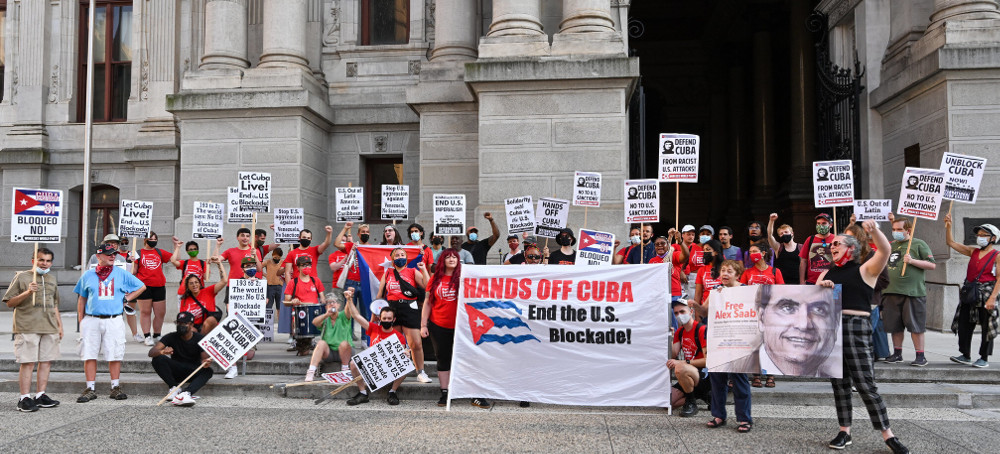 A Philadelphia coalition holds a rally calling for an end to US sanctions in Cuba in July 26, 2021. (photo: Joe Piette/Flickr)
A Philadelphia coalition holds a rally calling for an end to US sanctions in Cuba in July 26, 2021. (photo: Joe Piette/Flickr)
The Biden administration’s renewal of sanctions against Cuba reveals the folly of a long failed policy.
Conditions of want and need, however, should not be viewed as the unintended collateral consequences of sanctions. On the contrary: conditions of want and need are the purpose of sanctions. The policy is informed by a cynical logic to induce suffering and inflict hardship as a means to deepen Cuban discontent, whereupon–presumably–Cubans driven by want and motivated by need would rise up to remove a government the United States wishes gone. The “only foreseeable means of alienating internal support,” the Department of State insisted as early as April 1960, “is through disenchantment and disaffection based on economic dissatisfaction and hardship… Every possible means should be undertaken promptly to weaken the economic life of Cuba [and]… to bring about hunger, desperation and overthrow of government.” A simple cause-and-effect calculus, President Dwight Eisenhower reasoned: “If they [the Cuban people] are hungry they will throw Castro out.” Regime change would come from within and bottom-up, seemingly—as the State Department exulted—the “result of internal stresses and in response to forces largely, if not wholly, unattributable to the U.S.”
Punitive sanctions designed to do harm to the Cuban people as a means of regime change were subsequently recast as a policy of righteous purpose and noble intent on behalf of the best interests of the Cuban people. To support, as President Joe Biden pronounced in 2022, the “Cubans’ aspirations for freedom… and to allow the Cuban people to determine their own futures.” The United States taking it upon itself, in other words, to punish the Cuban people for their own good.
The degree to which U.S. sanctions have contributed–or not–to Cuban want and need is, of course, debatable. That sanctions are intended to promote want and need is not. Therein lies the tragic irony of 60 years of sanctions. Conditions of want and need are rarely circumstances conducive to reasoned political deliberations. A policy informed with malicious intent, designed purposely to foster deprivation and foment destitution, does not readily allow Cubans to envision the future in any form other than as an outlook of urgent immediacy. A people preoccupied with matters of subsistence as the overriding reality of daily life, obliged to deploy vast amounts of time and energy in pursuit of even the most minimum needs of everyday life, are unlikely to engage in deliberations on forms of democratic processes. A survey in 2008 published in the New York Times reported that more than half the Cubans interviewed considered economic needs to be their principal concern. Less than 10 percent identified political freedom as the main problem confronting the island. As a Cuban colleague once suggested to me: “First necessities, later democracy.”
Sanctions have indeed contributed to Cuban hardship and added to Cuban discontent. But the desired discontent has resulted less in expressions of organized disaffection than recurring cycles of mass emigration. The irony is not lost on informed observers. Those sectors of the population most likely to constitute themselves as a political opposition are often the very people most inclined to emigrate for reasons of personal hardship. Ironic too that at a time of the national mood turning dark about immigration from Latin America, U.S. policy serves to add to the woes of a people for whom emigration to the United States offers the most immediate remedy to hardship. An estimated 180,000 Cubans have sought asylum in 2022, many of whom have joined the swelling numbers assembling at the U.S.-Mexican border.
But the consequences are more complicated. Sanctions as subversion produce another kind of logic. The state—any state—does not equivocate on matters of national security. One cannot be surprised that a policy designed to foment political protest as a means of subversion enables the Cuban government to proscribe political protest as an act of subversion. Political protest thus passes under the pall of Fifth Column incitement, Cubans from within deemed to be enrolled in the service of regime change.
However, the authenticity of protest as a means through which to express discontent cannot be dismissed peremptorily as a deed of foreign mischief. Surely all is not well in Cuba. That much of what is not well in Cuba can be attributed to U.S. sanctions can hardly be gainsaid. But much of what is not well in Cuba can also be attributed to official policies and practices. The Cuban people bear a compelling and legitimate right collectively to articulate grievances, to register dissatisfaction and express discontent with ill-conceived economic policies that fail to remedy want and need, to protest the abridgement of civil liberties and the violation of human rights: in sum, to hold the government accountable for proper governance. To recognize the baneful consequences of U.S. sanctions is not to disregard or otherwise dismiss the failures of the Cuban government. Governmental policies and practices have indeed more than adequately contributed to the hardships borne by the Cuban people.
The protests of July 2021 responded to a vertiginous spiraling of shortages and scarcities in the face of a government seemingly without the policy capacity to relieve the pressing needs of daily life. Similarly, protests in October 2022 responded to dire conditions in the wake of Hurricane Ian. The hurricane served to reveal the utter fragility of an aging infrastructure. Existing chronic shortages of food, fuel, and medicine were exacerbated by flooding, loss of agriculture and livestock, and days of island-wide blackouts coming at a time of a protracted sweltering summer heat. All in all, these constituted conditions of sufficient urgency to prompt the Cuban government to request U.S. aid, to which the Biden administration acknowledged was the subject of “ongoing conversations” to assess “the humanitarian needs of the Cuban people.” On October 18, the Department of State offered Cuba $2 million in the form of “critical humanitarian aid” and promised to “continue to monitor and assess humanitarian needs [and] continue to seek ways to provide meaningful support to the Cuban people.”
The irony of the scene is palpable: Hurricane Ian contributing further to circumstances of Cuban want and need, a people prostrate soliciting U.S. humanitarian aid to relieve the very conditions to which sanctions have been dedicated to creating. The cynicism of the punitive intent of sanctions stands in sharp relief: humanitarian support to aid Cubans in want and need caused by the hurricane while continuing to induce want and need as the purpose of U.S. policy. In the end, perhaps the most egregious failure of sanctions lies in its ignorance of Cuban history. Cubans have long acted in discharge of agency as protagonists in their own history. They have repeatedly prevailed over misgovernment and maladministration. They have managed their own history without outside political interference. In fact, sanctions serve to compromise Cuban agency. They act to encumber and indeed often burden Cuban capacities to act in function of credible purpose on behalf of legitimate political change. A policy claiming to assist Cubans to “determine their own futures” contributes to a history without exit, to render that future as a time continually beyond reach, of providing neither remedy nor resolution and to holding a people captive to abeyance.
On the other hand, it is possible to imagine that the policy of sanctions has very little to do with Cuba. That sanctions are in fact all about the 29 electoral votes of Florida. In this instance, sanctions on Cuba are less about regime change in Cuba than a means of regime change in the United States.
READ MORE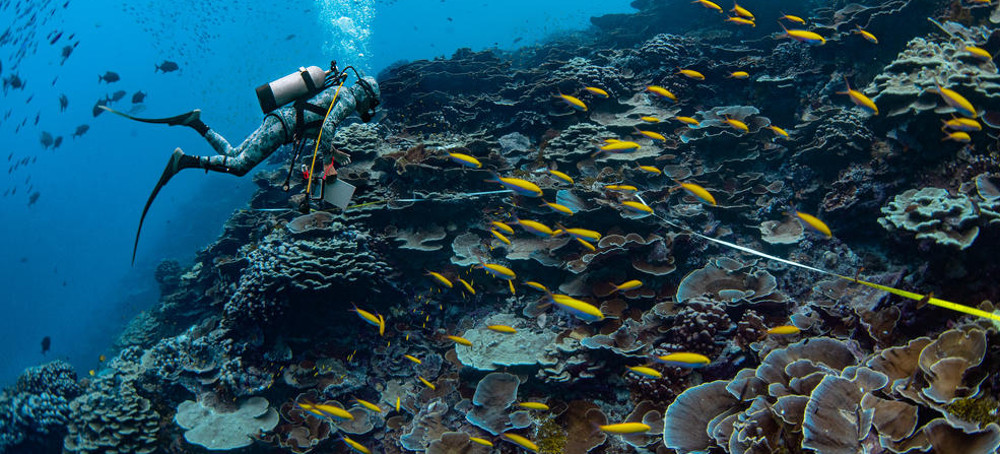 With measuring tape and notepad, marine ecologist Enric Ballesteros surveys the organisms living on a healthy reef in the islands. (photo: Jon Betz/National Geographic)
With measuring tape and notepad, marine ecologist Enric Ballesteros surveys the organisms living on a healthy reef in the islands. (photo: Jon Betz/National Geographic)
"We wanted to get into a time machine, go back hundreds of years and actually see a coral reef like they used to be everywhere, before we started exploiting them and polluting them and killing them all over the world," Sala said.
The goal was, in essence, made possible during an expedition that Sala led in 2009 with National Geographic Society. The team traveled to a corner of the South Pacific Ocean, to see if the vibrant and virtually untouched reefs there held any clues to bringing damaged reefs in other parts of the ocean back to health.
"The bottom was covered by thriving coral. It was, like, crystal-clear, blue, turquoise water, schools of silver jacks. And then the corals, pastels, oranges and beiges — it was so beautiful. It was like an impressionist painting," Sala said of the first time he saw those thriving reefs.
His team presented their findings to officials in the island country of Kiribati. The Kiribati government took steps to protect the waters from fishing and other human activity, but between 2015 and 2016, record levels of ocean warming decimated half the coral reefs the team had been studying.
After hearing that news, they lost hope for the health of coral reefs, thinking that the increase in temperature meant a certain doom. But, the study continued, and last year, they went in for another dive. Sala, dreading what he was about to find, jumped in with no gear.
"I look down, and my first thought is, did anything ever happen to this reef?"
Despite the reported conditions, the reef had somehow restored itself, filled with life and color once more. Sala and his team were elated. This resurrection is something that Sala says can be traced to two key factors.
The first is, thankfully, half of the corals had not died, as was previously thought. Despite the rise in temperatures, there were enough surviving corals left behind to help reproduce and replenish the reefs.
The second factor was the Kiribati government's decision to fully protect those waters.
"It has an abundance of fish that is off the charts. So they were eating all the algae that would smother the dead coral skeletons, and make it impossible for the corals to come back, which is what happens in other places like the Caribbean," Sala explained.
Protecting oceans from overfishing, Sala added, allows the ecosystem itself to become more resilient. In highly protected areas, the populations of fish grow so much that they spill over the boundaries of their areas and help replenish surrounding fishing grounds, in addition to allowing the ocean to capture and store more carbon to mitigate climate change.
"So if countries want a future for the fisheries, they need to manage their fisheries in a more responsible way around areas that are set aside to help regenerate the rest of the ocean," Sala said.
For him and his team, the rebirth of the coral reef in Kiribati is a beacon of hope among so much pessimism surrounding the future of reefs.
"It's great to show that protection of biodiversity, protection of marine life can actually provide resilience to global warming," he said.
Follow us on facebook and twitter!
PO Box 2043 / Citrus Heights, CA 95611



No comments:
Post a Comment
Note: Only a member of this blog may post a comment.